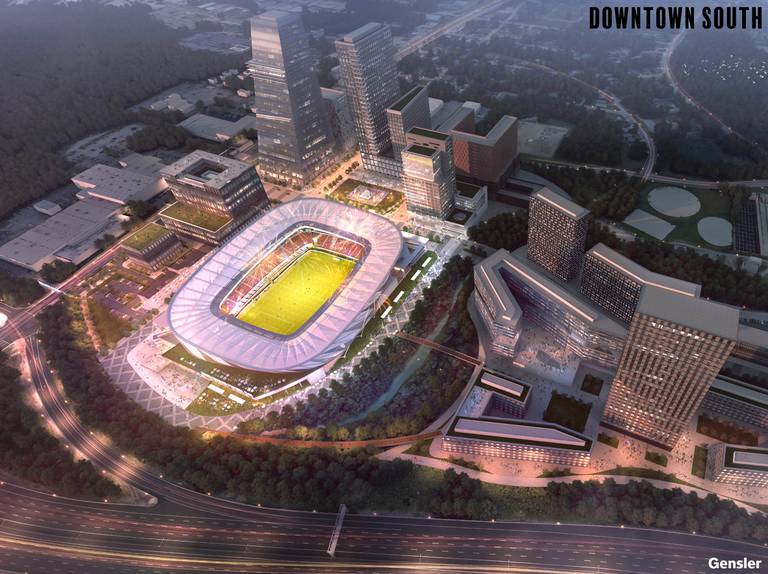
A proposed $1.9-billion mixed-use development in downtown Raleigh anchored by a USL Championship/NWSL stadium would attract new visitor activity to Wake County and would not compete with existing venues, according to a study released last week.
Prepared for the city of Raleigh and Wake County, the study from consultant JLL was tasked with evaluating the impact and potential of the proposed Downtown South development pitched by Steve Malik, owner of USL Championship’s North Carolina FC and NWSL’s North Carolina Courage. The study was basically a look at the project’s economic viability in advance of any public money spent on development, including county hospitality tax revenues (hotel lodging tax and food & beverage tax). The county is debating the use of hospitality taxes, used to create demand on the tourism side, under a Destination Strategic Plan set forth in 2018. The 12,000-capacity stadium has been pitched as just one amenity in a sprawling proposal, with 1.6 million square feet of office space, 1,200 hotel rooms, 1,750 apartments and 125,000 square feet of retail also part of the proposed scope of the development.
Originally proposed as an MLS-centered development, the focus shifted to a 12,000-capacity USL Championship/NWSL stadium when Charlotte was awarded the 30th MLS expansion team and the report turns that into a positive: “Moreover, the current focus of the stadium on NWSL or USL play (as compared to MLS play) offers a level of flexibility that will be needed to engender other activity and non-soccer activation of the overall development. As will be discussed further in this section, the lack of flexibility created by needing to comply with major league sports rules often hampers stadium design and use.”
As noted, the study focuses on the project’s ability to draw in visitors to Wake County and Raleigh—a key component of the use of tax funds for the project. The conclusion? Though USL Championship and NWSL soccer will be a draw, public investment of hospitality revenues is to be rationalized by additional events, including larger concerts, that would not compete with existing area venues. From the study’s key findings:
The existing brand-recognition of the proposed soccer tenants will provide an anchor. However, to fully leverage the facility’s ability to draw visitors and impact the area’s hospitality industry and quality of life for Wake County residents, a mix of other events is proposed to complement the soccer activation. These additional events will ensure the stadium is activated throughout the year and will provide activity to enhance the vibrancy of the Downtown South development.
Initial visitor projections suggest that for all uses, the impact of overnight visitors will not be high at the onset. Nevertheless, the activity at the stadium and within the entire development will have a broad-based impact on the Raleigh/Wake County community. It will serve as one of the placemaking amenities called for in the DSP and will provide an additional venue through which efforts to leverage event development as a driver for increased visitation can take place.
The Research Triangle area of Raleigh/Durham already features plenty of venues (six arenas, nine amphitheaters, eight ballparks/stadiums), but the Downtown South project could succeed with a flexible design allowing for a wide variety of events, ranging from small gatherings to big outdoor concerts and gatherings. As noted, the shift from an MLS focus to a USL Championship/NWSL focus allows for a more flexible design. And, at 12,000 capacity, a Downtown South stadium becomes the largest USL Championship venue for a soccer-specific venue not shared with an MLS team. In all, 10-12 large-scale concerts and festivals could be held annually at a new Downtown South facility. All in all, the cost estimated depend on 53 events, including soccer, at the stadium annually.
The potential cost of a new Raleigh stadium with 10,000 fixed seats and a total 12,000 capacity: between $140.7 million for a basic stadium and $210.7 million for a high-end facility with the potential expandability for MLS soccer.
RELATED STORIES: North Carolina FC Owner Moves Forward with Development Proposal; Details Emerge on New North Carolina FC Stadium Plan; North Carolina FC Stadium Funding Plan Faces Challenge; Latest North Carolina FC Stadium Plan to be Unveiled Next Week; Malik: Proposed Raleigh Soccer Stadium Not Contingent on MLS; North Carolina FC Stadium Pitch Focused on New Site; North Carolina Pitches $300M in Local Funding for New Raleigh MLS Stadium; MLS Expansion Talks Still Abuzz in North Carolina; Malik: Public Financing for North Carolina FC Stadium Possible
